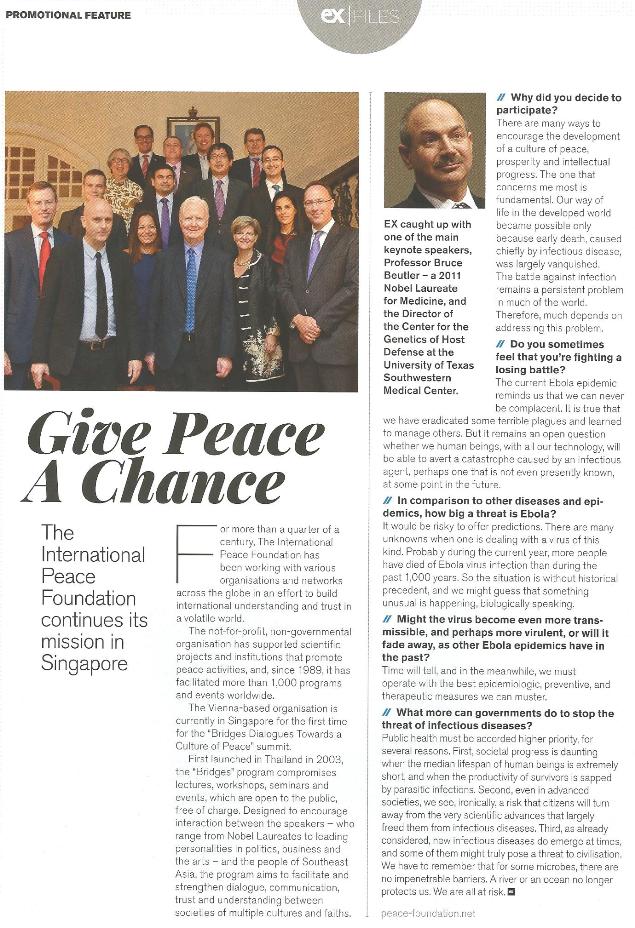|
| |
 |
|
Give Peace A Chance
|
Ex
December 2014/January 2015
Give Peace A Chance
The International Peace Foundation continues its mission in Singapore
For more than a quarter of a century, The International Peace Foundation has been working with various organisations and networks across the globe in an effort to build international understanding and trust in a volatile world.
The not-for-profit, non-governmental organisation has supported scientific projects and institutions that promote peace activities, and, since 1989, it has facilitated more than 1,000 programs and events worldwide.
The Vienna-based organisation is currently in Singapore for the first time for the "Bridges Dialogues Towards a Culture of Peace" summit.
First launched in Thailand in 2003, the "Bridges" program compromises lectures, workshops, seminars and events, which are open to the public, free of charge. Designed to encourage interaction between the speakers - who range from Nobel Laureates to leading personalities in po0litics, business and the arts - and the people in Southeast Asia, the program aims to facilitate and strengthen dialogue, communication, trust and understanding between societies of multiple cultures and faith.
EX caught up with one of the main keynote speakers, Professor Bruce Beutler - a 2011 Nobel Laureate for Medicine and the Director of the Center for Genetics of Host Defense at the University of Texas Southwestern Medical Center.
Why did you decide to participate?
There are many ways to encourage the development of a culture of peace, prosperity and intellectual progress. The one that concerns me the most is fundamental. Our way of life in the developed world became possible only because early death, caused chiefly by infectious decease, was largely vanquished. The battle against infection remains a persistent problem in much of the world. Therefore, much depends on addressing this problem.
Do you sometimes feel that you're fighting a losing battle?
The current Ebola epidemic reminds us that we never can be complacent. It is true that we have eradicated some terrible plagues and learned to manage others. But it remains an open question whether we human beings, with all our technology, will be able to avert a catastrophe caused by an infectious agent., perhaps one that is not even presently known, at some point in the future.
In comparison to other diseases and epidemics, how big a threat is Ebola?
It would be risky to offer predictions. There are many unknowns when one is dealing with a virus of this kind. Probably during the current year, more people have dies of Ebola virus infection than during the past 1,000 years. So the situation is without historical precedent, and we might guess that something unusual is happening, biologically speaking.
Might the virus become even more transmissible, and perhaps more virulent, or will it fade away, as other Ebola epidemics have in the past?
Time will tell, and in the meanwhile, we must operate with the best epidemiologic, preventive, and therapeutic measures we can muster.
What more can governments do to stop infectious diseases?
Public health must be accorded higher priority, for several reasons. First, societal progress is daunting when the median lifespan of human beings is extremely short, and when the productivity of survivors is sapped by parasitic infections. Second, even in advanced societies, we see, ironically, a risk that citizens will turn away from the very scientific advances that largely freed them from infectious diseases. Third, as already considered, new infectious diseases do emerge at times, and some of them might truly pose a threat to civilization. We have to remember that for some microbes, there are no impenetrable barriers. A river or an ocean no longer protects us. We are all at risk.

|
|
|
